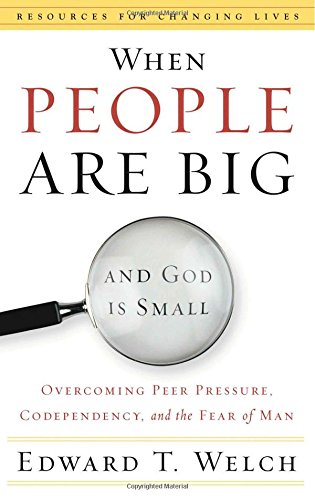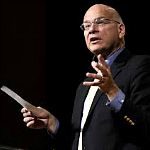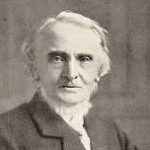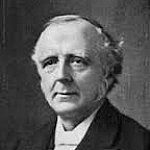Quotes about Fear_of_Man
It is not the being seen of men that is wrong, but doing these things for the purpose of being seen of men. The problem with the hypocrite is his motivation. He does not want to be holy; he only wants to seem to be holy. He is more concerned with his reputation for righteousness than about actually becoming righteous. The approbation of men matters more to him than the approval of God.
Fear is the response of the human heart when its one thing is threatened.
Courage…is the indispensable requisite of any true ministry… Courage is good everywhere, but it is necessary here. If you are afraid of men and a slave to their opinion, go and do something else. Go and make shoes to fit them… But do not keep on all your life preaching sermons which shall say not what God sent you to declare, but what they hire you to say.
Quoted in: Who Will Be Saved? Edited by: House, Paul and Thornbury, Gregory, Crossway, 2000, p. 101.
We fear men so much, because we fear God so little. One fear cures another. When man’s terror scares you, turn your thoughts to the wrath of God.
A Puritan Golden Treasury, compiled by I.D.E. Thomas, by permission of Banner of Truth, Carlisle, PA. 2000, p. 108.
The self-forgetful person would never be hurt particularly badly by criticism. It would not devastate them, it would not keep them up late, it would not bother them. Why? Because a person who is devastated by criticism is putting too much value on what other people think, on other people’s opinions.
If you stood alone, it would be presumption to hope. Because you are not alone, it is offence to tremble.
Faith, which is trust, and fear are opposite poles. If a man has the one, he can scarcely have the other in vigorous operation. He that has his trust set upon God does not need to dread anything except the weakening or the paralyzing of that trust.
Brethren, if our trust is in God, it is unworthy of it and of us to fear, for all things are His, and there is no evil in evil as men call it, so long as it does not draw away our hearts from our Father and our Hope. Therefore, he that fears let him trust; he that trusts let him not be afraid. He that sets his heart and anchors his hopes of safety on any except God, let him be afraid, for he is in a very stern world, and if he is not fearful he is a fool.
God incarnate is the end of fear; and the heart that realizes that He is in the midst… will be quiet in the middle of alarm.
So do you have an unhealthy fear that is robbing your joy and paralyzing your walk with Christ? If so, accept full responsibility for your fear. Recognize your fear is self-centered and ask for God’s forgiveness. Renew your thinking in line with what Scripture teaches. Replace the unrighteous fear of man with a righteous fear of God. Commit yourself to loving God and loving others.
Proverbs 1:7, “The fear of the LORD is the beginning of knowledge; fools despise wisdom and instruction” (cf. 9:10). Do you see an interesting connection? Knowledge of the Lord’s ways dispels fear, but the beginning of knowledge is fearing the Lord? Could it be the more we fear displeasing God and approach Him with reverential awe, the greater He will appropriate Himself in our lives? And the more we have of God, the less we will battle the short-lived, trivial fears of the world? Could it be that if we fear God there will be no one and nothing else left to fear? Wasn’t this the teaching of Jesus? “Do not fear those who kill the body but are unable to kill the soul; but rather fear Him who is able to destroy both soul and body in hell” (Mt. 10:28).
He who dares to face his Maker will not tremble before the sons of men.
[We must avoid] carnal fear; a man-fearing spirit; a shrinking from reproach and duty; reasoning around your cross; a shrinking from doing your whole duty by those of wealth or position; a fearfulness that someone will offend and drive some prominent person away; a compromising spirit.
[Self-esteem] is the most popular way that the fear of other people is expressed. If self-esteem is a recurring theme for you, chances are that your life revolves around what others think. You reverence or fear their opinions. You need them to buttress your sense of well-being and identity. You need them to fill you up.
When People are Big and God is Small, P&R Publishing, 1997, p. 15. Used by Permission. Get this book!
“Fear” in the biblical sense…includes being afraid of someone, but it extends to holding someone in awe, being controlled or mastered by people, worshipping other people, putting your trust in people, or needing people.
When People are Big and God is Small, P&R Publishing, 1997, p. 14. Used by Permission. Get this book!
However you put it, the fear of man can be summarized this way: We replace God with people. Instead of a biblically guided fear of the Lord, we fear others.
When People are Big and God is Small, P&R Publishing, 1997, p. 14. Used by Permission. Get this book!
The “fear of man” goes by other names. When we are in our teens, it is called “peer pressure.” When we are older, it is called “people-pleasing.” Recently, it has been called “codependency.” With these labels in mind, we can spot the fear of man everywhere.
When People are Big and God is Small, P&R Publishing, 1997, p. 14. Used by Permission. Get this book!
The most radical treatment for the fear of man is the fear of the Lord. God must be bigger to you than people are.
When People are Big and God is Small, P&R Publishing, 1997, p. 19. Used by Permission. Get this book!
1. We fear people because they can expose and humiliate us. 2. We fear people because they can reject, ridicule, or despise us. 3. We fear people because they can attack, oppress, or threaten us. These three reasons have one thing in common: they see people as “bigger” (that is, more powerful and significant) than God, and, out of the fear that creates in us, we give other people the power and right to tell us what to feel, think, and do.
When People are Big and God is Small, P&R Publishing, 1997, p. 23. Used by Permission. Get this book!
If the gaze of man awakens fear in us, how much more so the gaze of God. If we feel exposed by people, we will feel devastated before God. To even think of such things is too overwhelming. Our hearts tremble at the thought, and we do everything we can to avoid it. One way to avoid God’s eyes is to live as if fear of other people is our deepest problem – they are big, not God.
When People are Big and God is Small, P&R Publishing, 1997, p. 33. Used by Permission. Get this book!
ALL experiences of the fear of man share at least one common feature: People are big. They have grown to idolatrous proportions in our lives. They control us. Since there is no room in our hearts to worship both God and people, whenever people are big, God is not. Therefore, the first task in escaping the snare of the fear of man is to know that God is awesome and glorious, not other people.
When People are Big and God is Small, P&R Publishing, 1997, p. 95. Used by Permission. Get this book!
The fear of man is no respecter of persons. It might be called codependency with adults, peer pressure with teens, and shyness with children, but whatever it is called, it all betrays the same idolatrous heart.
When People are Big and God is Small, P&R Publishing, 1997, p. 192. Used by Permission. Get this book!
Isolation and the fear of man are close companions.
When People are Big and God is Small, P&R Publishing, 1997, p. 198. Used by Permission. Get this book!
We stand at the crossroads between fear of others and fear of God. The road leading to the fear of man may be expressed in terms of favoritism, wanting others to think well of you, fearing exposure by them, or being overwhelmed by their perceived physical power. When these fears are not combated with the fear of the Lord, the consequences can be devastating. But when God is given his rightful place in our lives, old bonds can be shattered.
When People are Big and God is Small, P&R Publishing, 1997, p. 71. Used by Permission. Get this book!
We are more concerned about looking stupid (a fear of people) than we are about acting sinfully (fear of the Lord).
When People are Big and God is Small, P&R Publishing, 1997, p. 40. Used by Permission. Get this book!
Fear of people is often a more conscious version of being afraid of God. That is, we are more conscious of our fear of others than our fear of God. Granted, fear of others is a real phenomenon. We really are afraid of the thoughts, opinions, and actions of other people. But under that we hide as best we can the more desperate fear of God.
When People are Big and God is Small, P&R Publishing, 1997, p. 33. Used by Permission. Get this book!
What is the result of…people-idolatry? As in all idolatry, the idol we choose to worship soon owns us. The object we fear overcomes us. Although insignificant in itself, the idol becomes huge and rules us. It tells us how to think, what to feel, and how to act. It tells us what to wear, it tells us to laugh at the dirty joke, and it tells us to be frightened to death that we might have to get up in front of a group and say something. The whole strategy backfires. We never expect that using people to meet our desires leaves us enslaved to them.
When People are Big and God is Small, P&R Publishing, 1997, p. 46. Used by Permission. Get this book!
Recommended Books












